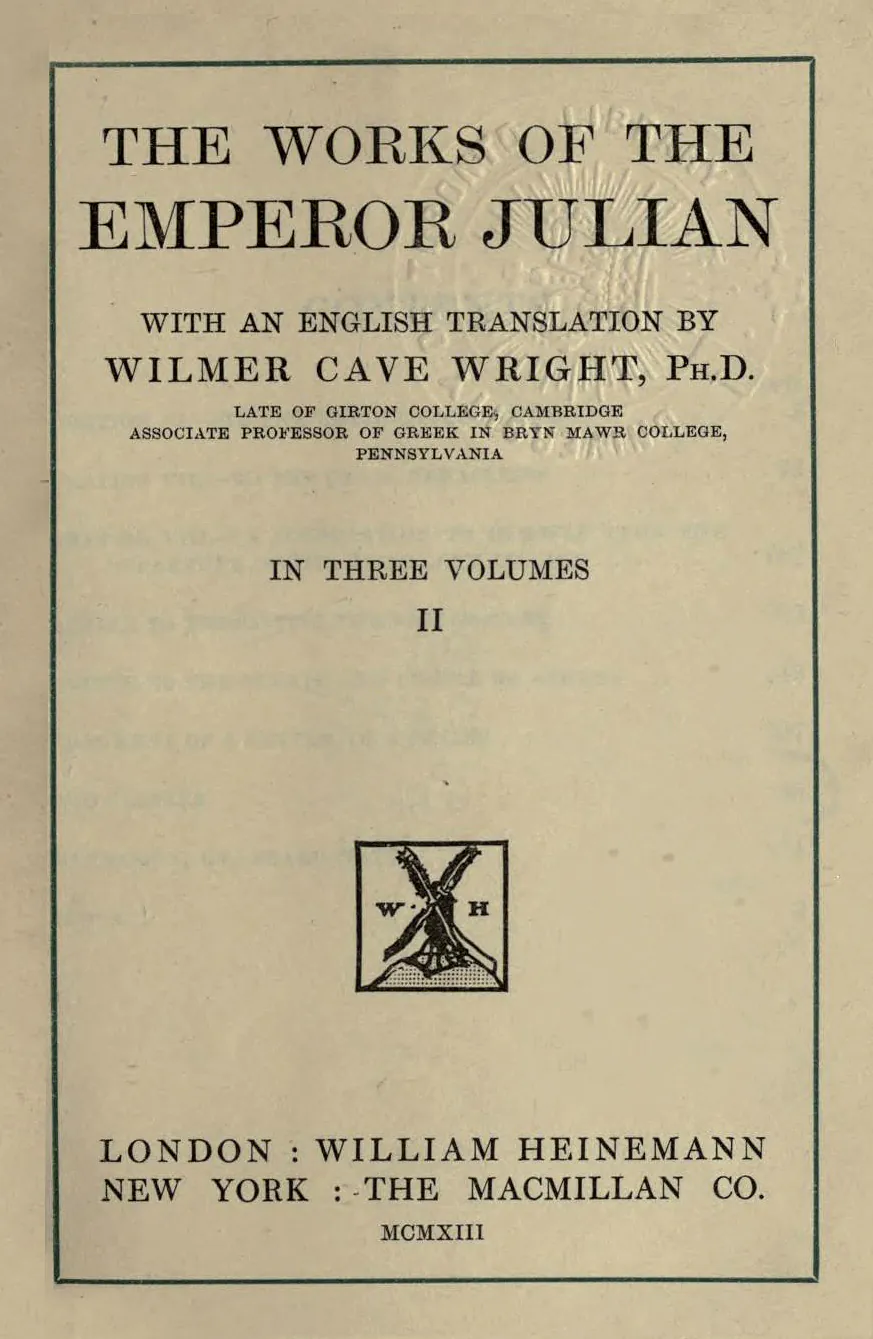[A]
εἶναι γὰρ οἶμαι συμβαίνει τοῖς φαύλοις τὴν μουσικὴν λυπηροῖς μὲν τοῖς θεάτροις, σφίσι δ ̓ αὐτοῖς ἡδίστοις. ὁ δὴ καὶ αὐτὸς ξυννοήσας εἴωθα πρὸς ἐμαυτὸν λέγειν ὅπερ ὁ Ἰσμηνίας οὐκ ἀπὸ τῆς ἴσης μὲν ἕξεως, ἀπὸ δὲ τῆς ὁμοίας, ὡς ἐμαυτὸν πείθω, μεγαλοφροσύνης, ὅτι δῆτα ταῖς μούσαις ᾄδω καὶ ἐμαυτῷ.
Τὸ δ ̓ ᾆσμα πεζῇ μὲν λέξει πεποίηται, λοιδορίας δ ̓ ἔχει πολλὰς καὶ μεγάλας, οὐκ εἰς ἄλλους μὰ Δία·
[B]
πῶς γάρ; ἀπαγορεύοντος τοῦ νόμου· εἰς δὲ τὸν ποιητὴν αὐτὸν καὶ τὸν ξυγγραφέα. τὸ γὰρ εἰς ἑαυτὸν γράφειν εἴτε ἐπαίνους εἴτε ψόγους εἴργει νόμος οὐδείς. ἐπαινεῖν μὲν δὴ καὶ σφόδρα ἐθέλων ἐμαυτὸν οὐκ ἔχω, ψέγειν δὲ μυρία, καὶ πρῶτον ἀρξάμενος ἀπὸ τοῦ προσώπου. τούτῳ γὰρ οἶμαι φύσει γεγονότι μὴ λίαν καλῷ μηδ ̓ εὐπρεπεῖ μηδ ̓ ὡραίῳ ὑπὸ δυστροπίας καὶ δυσκολίας αὐτὸς
[C]
προστέθεικα τὸν βαθὺν τουτονὶ πώγωνα, δίκας αὐτὸ πραττόμενος, ὡς ἔοικεν, οὐδενὸς μὲν ἄλλου, τοῦ δὲ μὴ φύσει γενέσθαι καλόν. ταῦτά τοι διαθεόντων ἀνέχομαι τῶν φθειρῶν ὥσπερ ἐν λόχμῃ τῶν θηρίων. ἐσθίειν δὲ λάβρως ἢ πίνειν χανδὸν οὐ συγχωροῦμαι· δεῖ γὰρ οἶμαι προσέχειν, μὴ λάθω συγκαταφαγὼν1συγκαταφαγὼν Cobet, καὶ συγκαταφαγὼν Hertlein, MSS. τὰς τρίχας τοῖς ἄρτοις.
[D]
ὑπὲρ δὲ τοῦ φιλεῖσθαι καὶ φιλεῖν ἥκιστα ἀλγῶ. καίτοι καὶ τοῦτο ἔχειν ἔοικεν ὁ πώγων ὥσπερ τὰ ἄλλα λυπηρόν, οὐκ ἐπιτρέπων καθαρὰ λείοις καὶ διὰ τοῦτο οἶμαι γλυκερώτερα χείλεσι χείλη προσμάττειν, ὅπερ ἤδη τις ἔφη τῶν ἐργασαμένων ξὺν τῷ Πανὶ καὶ τῇ Καλλιόπῃ εἰς τὸν Δάφνιν ποιήματα. ὑμεῖς δέ φατε δεῖν καὶ σχοινία πλέκειν ἐνθένδε· καὶ ἕτοιμος παρέχειν, ἢν μόνον ἕλκειν δυνηθῆτε καὶ μὴ τὰς ἀτρίπτους ὑμῶν καὶ μαλακὰς χεῖρας ἡ τραχύτης αὐτῶν δεινὰ ἐργάσηται. νομίσηι δὲ μηδεὶς δυσχεραίνειν ἐμὲ τῷ σκώμματι.
[A]
For I think it is always the case that inferior musicians, though they annoy their audiences, give very great pleasure to themselves. And with this in mind I often say to myself, like Ismenias – for though my talents are not equal to his, I have as I persuade myself a similar independence of soul – “I sing for the Muses and myself.”2For Ismenias of Thebes cf. Plutarch, Pericles. The saying became a proverb; cf. Dio Chrysostom, Oration 78. 420; Themistius 366 B; Burton, Anatomy of Melancholy, “I have lived mihi et Musis in the University.”
However the song that I now sing has been composed in prose, and it contains much violent abuse, directed not, by Zeus, against others
[B]
–how could it be, since the law forbids?– but against the poet and author himself. For there is no law to prevent one’s writing either praise or criticism of oneself. Now as for praising myself, though I should be very glad to do so, I have no reason for that; but for criticising myself I have countless reasons, and first I will begin with my face. For though nature did not make this any too handsome or well-favoured or give it the bloom of youth, I myself out of sheer perversity and ill-temper have added to it this long beard of mine,
[C]
to punish it, as it would seem, for this very crime of not being handsome by nature. For the same reason I put up with the lice that scamper about in it as though it were a thicket for wild beasts. As for eating greedily or drinking with my mouth wide open, it is not in my power; for I must take care, I suppose, or before I know it I shall eat up some of my own hairs along with my crumbs of bread.
[D]
In the matter of being kissed and kissing I suffer no inconvenience whatever. And yet for this as for other purposes a beard is evidently troublesome, since it does not allow me to press shaven “lips to other lips more sweetly” – because they are smooth, I suppose – as has been said already by one of those who with the aid of Pan and Calliope composed poems in honour of Daphnis.3Daphnis is the hero of bucolic poetry; Julian echoes Theocritus 12. 32 ὃς δέ κε προσμάξῃ γλυκερώτερα χείλεσι χείλη. But you say that I ought to twist ropes from it. Well I am willing to provide you with ropes if only you have the strength to pull them and their roughness does not do dreadful damage to your “unworn and tender hands”.4Odyssey 22. 151; cf. Zonaras 13. 12. 213, Dindorf. And let no one suppose that I am offended by your satire.
EN translation: Wilmer Cave Wright, 1913
LEARN MORE
Place your mouse over a term to see corresponding popup from Wikipedia.
ALL PAGES

| Title | London: The Works of the Emperor Julian, Volume II/III |
| Publisher | London: William Heinemann |
| Year | 1913-23 |
| Pages | 416-511 pp. [vol. II: 538 pp.] |
| Translation | Wilmer Cave Wright. PhD |
| Editors | T.E. Page and W.H.D. Rouse |


